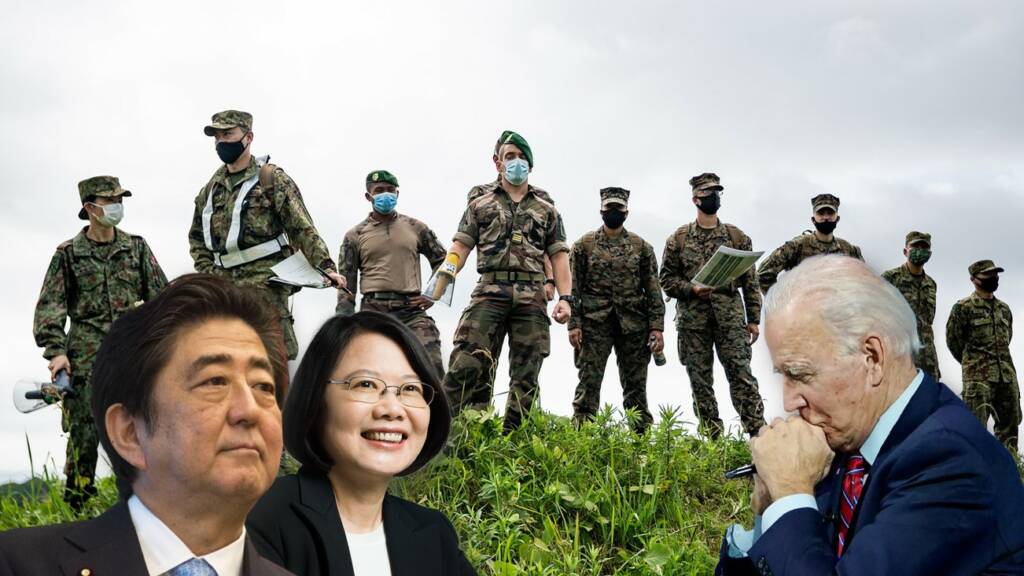Shinzo Abe is one of the few world leaders who still hold substantial influence with respect to their country’s foreign policy as they did during their term in office. We at TFIGlobal had reported about the way in which Abe-san has accelerated close cooperation between Japan and Taiwan. We have also shed light on how he came to the support of Taiwan’s government after Joe Biden publicly humiliated the Island nation in the Democracy Summit. Now, the latest developments prove that all the statements and policy directions professed by Shinzo Abe are bearing fruit and even the Biden administration is following suit.
According to Japan’s Kyodo news agency, the US and Japanese forces have drawn out a draft report for a joint operation whenever an emergency with Taiwan erupts. At the first sign of a Taiwan emergency, the US Marine Corps would deploy troops and set up temporary bases on the Nansei island chain, a Japanese archipelago that runs toward Taiwan, according to Kyodo. Meanwhile, the Japanese armed forces would provide logistical support in the form of ammunition and fuel supplies. The fact that this draft has seen the light of the day after Joe Biden humiliated Taiwan, goes on to show how influential Shinzo Abe is.
Shinzo Abe’s direct warning to Joe Biden
Abe stepped down as Prime Minister in 2020 after nearly eight years in office, although one should not forget that he still leads the ruling Liberal Democratic Party’s largest faction. On 14th December, Abe gave a virtual address, in English, at a Taiwan-U.S.-Japan event hosted by the Prospect Foundation think tank in Taipei.
Also read: Shinzo Abe’s clever game with China is a lesson in international diplomacy
Speaking after opening remarks by Taiwan’s President Tsai Ing-wen, Abe again called attention to the Island’s security. He linked the potential for cross-strait war to Tokyo’s own defence planning and the close relationship between the JSDF and U.S. forces. He also encouraged continued defence improvements in Japan, Taiwan, and the U.S.
He said that weakness breeds provocations and, therefore, Japan, Taiwan, and the US must make every effort to improve the collective capabilities in all areas, including underwater, sea surface, airspace, cyber, and outer space.
Read more: Shinzo Abe names “Chairman Xi Jinping” and threatens him of dire military consequences
While these statements may seem like Abe’s direct warning to China, but, in reality, these messages are meant for Joe Biden to stay consistent with the larger policy choices of Taiwan and Japan if it wants to maintain the alliance structure in East Asia. While these statements may seem like Abe’s direct warning to China, but, in reality, these messages are meant for Joe Biden to stay consistent with the larger policy choices of Taiwan and Japan if it wants to maintain the alliance structure in East Asia.
The Shinzo Abe effect
After Taiwan’s digital minister Audrey Tang appeared via video link to address the US-hosted democracy summit and the following humiliation Tang had to face, Shinzo Abe came out with full force in support of Taiwan. His statement was followed by the Japanese government creating a separate office for dealing bilaterally with Taiwan and possible cooperation. Now, the warnings sent by Abe-san to Joe Biden are catching up to the US administration as it too falls in line.
Also read: Shinzo Abe sends out a stern message to China, but it’s meant for Biden
Japan and the US have thus made it final- if China actualises its outrageous plan to invade Taiwan, the US Marines will beat the Chinese PLA troops black and blue, effectively terminating China’s Taiwan dreams. Japan is therefore leaving no stone unturned. It has realised that it has to fight China sooner or later, and it is preparing for it on a war-footing. Japan is going the Shinzo Abe way and is not waiting for any support from the US or any other country.
The USA under Joe Biden has realised that statements by Shinzo Abe and the actions of the Japanese government are in line. And if Washington wishes to maintain some semblance of alliance structure in East Asia, it will need to play by the rules Tokyo sets.
